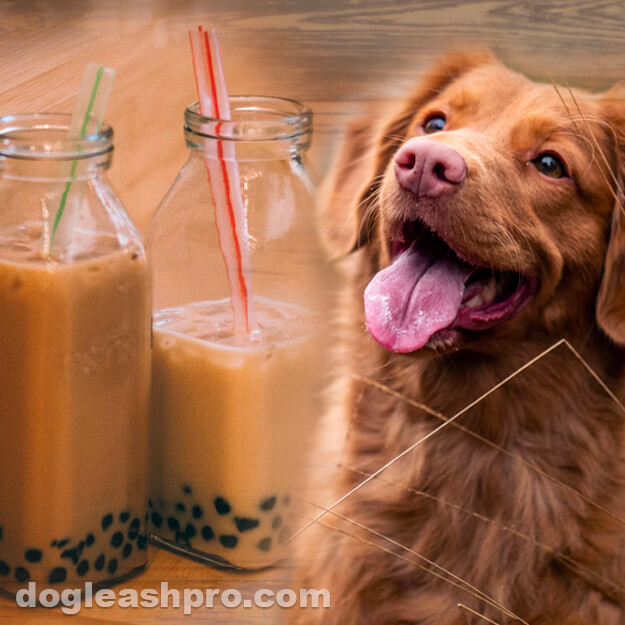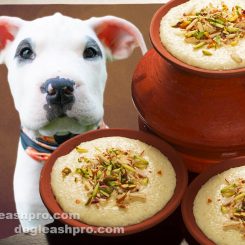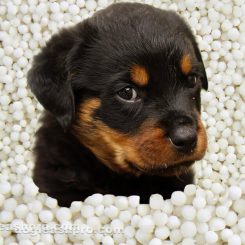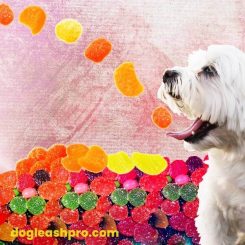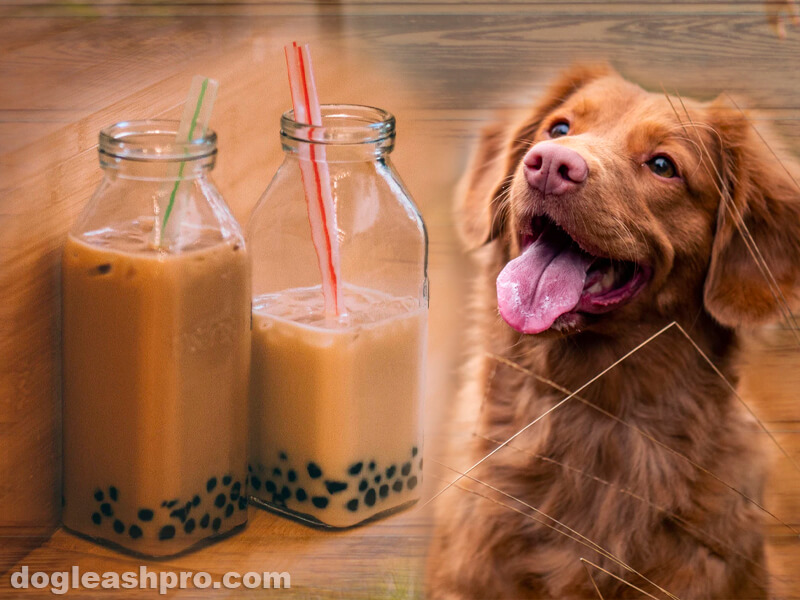
Every Friday, I would celebrate the end of the workweek by having a Boba break around 4 pm. My nearest Boba shop is only a few feet away and I would order Boba milk tea with those chewy black Tapioca. It’s a guilty pleasure of mine. My dogs would stare at my drink and I would feel sad for not sharing it. Below are the reasons why I don’t share my Boba with them.
Can dogs eat Boba? No, dogs should not eat Boba. The Boba drink is high in sugar, fat, and calories. Boba also contains ingredients that are potentially harmful to dogs. There are far more negative than positive when it comes to Boba.
Table of Contents
Can dogs have Boba?
No, dogs should not have Boba. Let’s find out what Boba is and what is in that Boba milk tea drink that makes it so dangerous for dogs.
What is Boba?
Boba is the soft (or hard) chewy black round pearls found at the bottom of a Boba milk tea. It is generally made of tapioca. The traditional color of the Tapioca pearls is black. These days, you can find Tapioca pearls in a variety of pastel colors.
In your day-to-day life, you’ve probably heard this question from your friends or coworkers during midday, “Do you want to get Boba?” When people ask this question, they’re referring to the actual drink called Boba bubble tea.
In this article, we will discuss Boba from both perspectives: the tapioca pearls as well as the drink itself.
What is Boba tea made of?
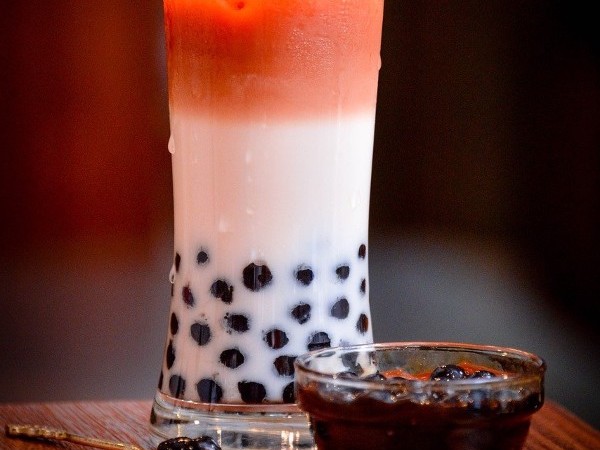
Boba bubble tea is a sweet creamy drink that consists of the following four main ingredients:
- Creamer. Some shops use milk, half-n-half, or powder creamer.
- Flavors usually come from fruit purees, flavored syrup, or flavored powder.
- Liquid. If you want milk tea, the liquid they use is milk. If you prefer tea, they will use water or tea.
- Sweetener helps to give the Boba tea its sweet flavors. It’s common to use honey, fructose, simple sugar syrup, and sugar depending on your drink preference. If you prefer sugar-free sweeteners, there are options like Stevia, Aspartame, and Sucralose.
Fun Fact: Sprite is another caffeinated drink that is harmful to our canine companions.
The Boba drink usually comes in a disposable plastic cup that is filled with the above four ingredients as well as a handful of Tapioca pearls. Due to their weight, the tapioca pearls usually sink to the bottom of the cup. Some people may not like Tapioca pearls so they opt for other chunky items like aloe, jelly, coconut flesh, and beans.
It’s common to enjoy this Boba tea with a 12mm straw so they can get a mouthful of the drink and the tapioca pearls or other chunky items. The Boba drink is usually covered with a sealed film. When you poke the 12mm straw through this film, it creates a fun popping sound, which is part of the experience.
Many people enjoy Boba during the afternoon or evenings when they need a “boba break.” This caffeinated drink originated from Taipei, the capital of Taiwan.
On the west coast of the U.S., many people refer to this drink as Boba. If you go to California, specifically Southern California (SoCal), or the main cities of Northern California (NorCal), it is popularly known as Boba. However, if you are on the east coast of the U.S. like New York, many people refer to Boba as bubble tea or pearl milk tea.
What is Boba made of?
Let’s dive deep into the ingredients of Boba and the Boba drink to find out whether Boba is safe for doggy consumption.
Tapioca pearls (Safe in moderation)
The black pearls in Boba are made from tapioca. Tapioca is safe for dogs to eat. In fact, tapioca flour or tapioca starch is usually found in many dog foods such as canned dog food or kibbles.
Tapioca is also great for dogs that are allergic to grain-based starches in their food and is a perfect gluten-free flour option for your furry friends.
However, be careful when feeding too many tapioca pearls to your pooch. They do contain a lot of sugar and carbohydrates. Additionally, since dogs tend to swallow before chewing, these small tapioca pearls can be a choking hazard and lead to suffocation.
Tapioca pearls that are not properly chewed may cause intestinal blockage in dogs and lead to constipation.
Handy Hint: If you’re giving your four-legged friends Reese’s Pieces, make sure to cut it up to smaller pieces to avoid choking, intestinal obstruction, and suffocation.
Milk and Half-n-Half (Harmful especially if dogs are lactose intolerant)
If your dog is lactose intolerant, it’s best that you do not allow them to lick or drink the Boba tea as it contains dairy products such as milk or half-n-half.
Canines that are lactose intolerant lack the lactase enzyme that is responsible for breaking down lactose, a sugar that is found in dairy products like milk. Too much milk or half-n-half can lead to intestinal upset, vomiting, and diarrhea.
If your pooch is fine with dairy products, consider feeding them dairy products in moderation
Powder creamer and Flavored powder (Harmful)
Boba that uses powder creamer is considered harmful to our furry friends. The ingredients in powder creamer include but are not limited to:
- Hydrogenated vegetable oil (coconut and/or palm kernel and/or soybean)
- Corn syrup solids
- Sodium caseinate
- Artificial flavor
- Annatto color
- Mono and diglycerides
- Dipotassium phosphate
- Sodium aluminosilicate
Hydrogenated vegetable oil is usually processed which makes them bad for our pooch. It’s difficult for our dog’s body to properly digest food with hydrogenated oils. Hydrogenated oil has a plastic-like nature so the digestive enzymes in your furry friend’s stomach will try to continually break it down which will cause their stomach temperature to increase. This can lead to health problems in dogs.
Additionally, the blood will become pretty thick and harder to flow through the veins so your dog’s heart will have to work harder to move this blood throughout your canine’s body.
Regularly feeding your canine family member food that contains hydrogenated oil can clog their arteries and ultimately affect their brain and brain functions.
Keep food that has hydrogenated oil in it away from your furry family members.
Corn syrup is added sugar which your pup does not need. Excess sugar consumption can lead to canine obesity.
Similar to Fruit Snacks, an annatto color is used as one of the ingredients in powder creamer to help give the creamer some color. It is a vegetable dye that’s not safe for dogs. If you don’t know what it is, most likely it may not be good for your pooch.
If you use powder creamer in your Boba, please avoid feeding it to your furry friends.
Fruit purees (Safe in moderation)
It is safe to give your canine companion fruit puree as that is the only healthy ingredient in Boba that is safe for dogs. However, the fruit purees are mixed with other ingredients in this drink. This is why Boba is no longer healthy for doggy consumption.
There are many fruits if your four-legged friends love fruits. It’s best to cut up fruits like apples, blueberries, and pumpkins at home and make fruit purees out of them. This is a healthier option to satisfy your dog’s fruit cravings.
Flavored syrup, simple sugar syrup, and sugar (Harmful)
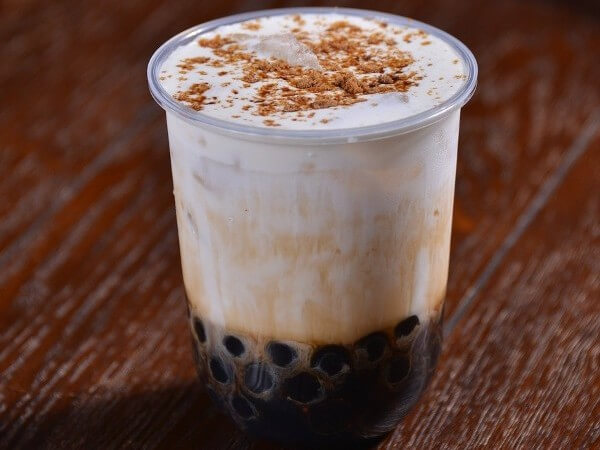
Syrup in general is high in sugar. Sugar can be addicting so your pooch may crave more sugar. Dogs should get their sugar from carbohydrates. The flavored syrup in Boba is added sugar that dogs don’t need.
Excess sugar from flavored syrup can lead to the following:
- Obesity.
- Diabetes.
- Liver failure.
- Hypoglycemia.
Honey (Safe in moderation)
Honey is safe in moderation because it does contain sugar, which can cause dental issues like tooth decay. Make sure your Boba does not contain raw honey. Raw honey is harmful to dogs with compromised or weak immune systems.
Fructose (Safe if it’s from fruits that are safe for dogs)
If the fructose is from fruits that are safe for dogs like apples, blueberries, strawberries, then it’s fine. Fructose from fruits like grapes are toxic to dogs. Before you allow your dog to get a taste of your Boba, make sure the fructose is from fruits that are safe for them.
Stevia, aspartame, and sucralose
Be careful if you use sugar substitutes like stevia, aspartame, or sucralose.
Consuming too much stevia can cause diarrhea. Aspartame is very sweet. In fact, it is 200 times sweeter than sugar which is very concerning. Dogs that ingest aspartame in large amounts can have gastrointestinal discomfort. Sucralose is also very sweet and like aspartame, if your pooch consumes too much of it, it can cause gastrointestinal upset in dogs.
So if you use any of these artificial sweeteners in your Boba tea, be sure to keep it away from your pooch.
Tea (Harmful if caffeinated)
If the tea used in your Boba is caffeinated, then it’s best not to share your Boba with your canine pooch. Green tea or black tea are two common types of tea used in Boba and both contain caffeine.
If your dogs like tea, it’s best to go with Peppermint tea or other teas that aren’t caffeinated.
Calories in Boba
In addition to the ingredients in Boba, let’s take a look at how many calories a typical Boba drink has.
A 16 fl oz Boba milk tea contains 317.5 calories with 10.6g of fat.
A 16 fl oz Boba tea (either black or green tea with fructose) contains 231.5 calories.
Keep in mind that a dog should only consume 25 calories for each pound they weigh.
For example, if you have both a small and a medium dog, then:
- A 10-pound small dog (Chihuahua) should only consume a maximum of 250 calories per day.
- A 70-pound medium dog (Labrador) should only consume a maximum of 1,750 calories per day.
In this case, the calories in a 16 fl oz Boba milk tea would surpass a small dog’s maximum calorie intake and a 16 fl oz Boba tea would come close to its 250 daily calorie limit.
When shouldn’t you feed Boba to your dog?
It’s best to avoid feeding Boba to your pooch if they are diabetic, obese, have liver or kidney failure, and are allergic to tapioca. Ingesting Boba would only worsen these existing health problems.
Does Boba provide any nutritional benefit for your dog?
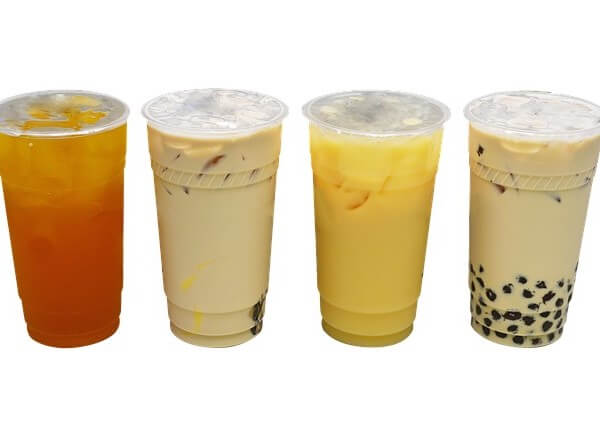
No, Boba does not provide any nutritional benefit for your pooch. This sweet sugary drink is made for human consumption and taste buds. It’s a drink that satisfies the human sweet tooth and is not healthy for dogs.
Boba is loaded with sugar, fat, and calories. For these reasons, it’s best to keep Boba away from dogs.
Symptoms if your dog accidentally eats Boba
Regularly eating Boba can lead to the following symptoms:
- Gastrointestinal upset and discomfort.
- Stomach Ache.
- Weight gain.
- Obesity.
- Diabetes.
- Dental issues.
- Vomiting.
- Diarrhea.
How do I make Boba for my dog at home?
When you’re making Boba for your pups at home, make sure to fully cook the tapioca pearls. After the tapioca pearls are fully cooked, they should be chewy. It’s best to cut them into small pieces and add them to your dog’s regular food as they are too small for your dogs to chew on.
Be sure not to feed them the drinks. Tapioca pearls by themselves should be fine, but not the added ingredients in the drinks.
So, can dogs eat Boba?
From the information above, it’s best to keep Boba away from your furry friends. If they occasionally eat a tapioca pearl or two, that should be fine. Avoid feeding this to your pooch if they have existing health issues or conditions.
Related Questions
Yes, dogs can eat one or two Boba if you’re referring to the tapioca pearls. A tapioca pearl would not harm your dog but be sure it is in very small pieces so it does not become a choking hazard.
Yes, dogs can eat Boba balls in moderation. Boba balls from the store contain sugar and carbohydrates so try not to give your pooch too much Boba balls. Again, be sure to cut it into very small pieces as the Boba ball can get stuck in the dog’s throat and cause choking or get stuck in the small intestines.
It depends on what the fruit Boba balls are. Some fruits like grapes are toxic to dogs. Strawberries fruit Boba balls should be fine.
DISCLAIMER: THIS WEBSITE DOES NOT PROVIDE MEDICAL ADVICE
The information, including but not limited to, text, graphics, images and other material contained on this website are for informational purposes only. No material on this site is intended to be a substitute for professional veterinary advice, diagnosis, or treatment. Always seek the advice of your veterinarian or other qualified health care provider with any questions you may have regarding dietary needs.
Resources:
https://en.wikipedia.org/wiki/Tapioca
https://en.wikibooks.org/wiki/Cookbook:Tapioca

With over five years of specialized experience as an animal writer, my expertise lies in dog nutrition, health, behavior, grooming, and training. I am dedicated to delivering helpful and informative content that caters to the well-being of our furry friends. My primary goal is to empower pet owners with knowledge and ensure our canine companions thrive in health and happiness. In my free time, I love volunteering at local dog rescue centers.
